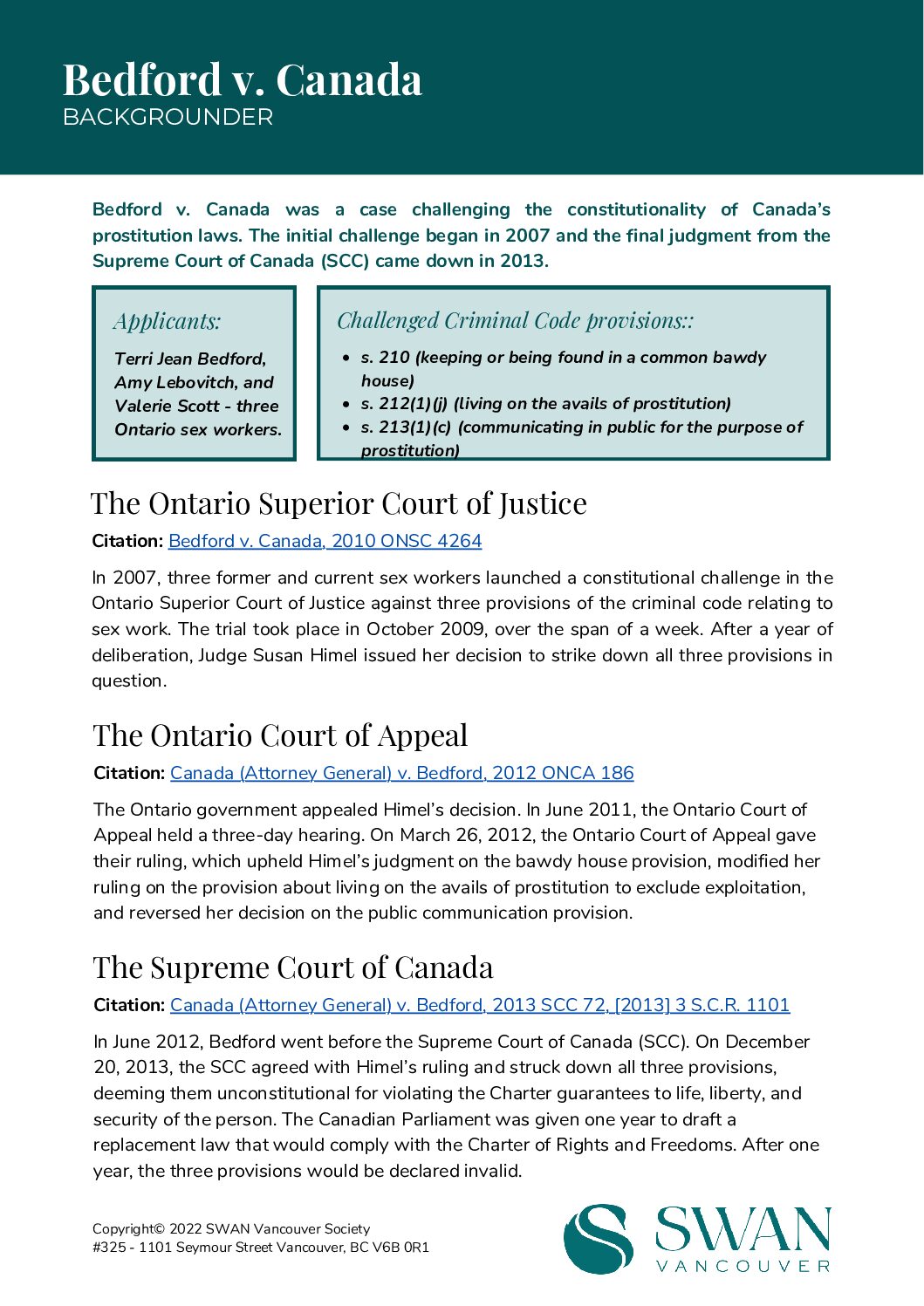Bedford v. Canada was a case challenging the constitutionality of Canada’s prostitution laws. The initial challenge began in 2007 and the final judgment from the Supreme Court of Canada (SCC) came down in 2013.
Applicants:
Terri Jean Bedford, Amy Lebovitch, and Valerie Scott – three Ontario sex workers.
Challenged Criminal Code provisions:
- s. 210 (keeping or being found in a common bawdy house)
- s. 212(1)(j) (living on the avails of prostitution)
- s. 213(1)(c) (communicating in public for the purpose of prostitution)
The Ontario Superior Court of Justice
Citation: Bedford v. Canada, 2010 ONSC 4264
In 2007, three former and current sex workers launched a constitutional challenge in the Ontario Superior Court of Justice against three provisions of the criminal code relating to sex work. The trial took place in October 2009, over the span of a week. After a year of deliberation, Judge Susan Himel issued her decision to strike down all three provisions in question.
The Ontario Superior Court of Justice
Citation: Canada (Attorney General) v. Bedford, 2012 ONCA 186
The Ontario government appealed Himel’s decision. In June 2011, the Ontario Court of Appeal held a three-day hearing. On March 26, 2012, the Ontario Court of Appeal gave their ruling, which upheld Himel’s judgment on the bawdy house provision, modified her ruling on the provision about living on the avails of prostitution to exclude exploitation, and reversed her decision on the public communication provision.
The Supreme Court of Canada
Citation: Canada (Attorney General) v. Bedford, 2013 SCC 72, [2013] 3 S.C.R. 1101
In June 2012, Bedford went before the Supreme Court of Canada (SCC). On December 20, 2013, the SCC agreed with Himel’s ruling and struck down all three provisions, deeming them unconstitutional for violating the Charter guarantees to life, liberty, and security of the person. The Canadian Parliament was given one year to draft a replacement law that would comply with the Charter of Rights and Freedoms. After one year, the three provisions would be declared invalid.
Notable Comments from Bedford v. Canada
THE BAWDY-HOUSE PROHIBITION (s. 210)
“The harms identified by the courts below are grossly disproportionate to the deterrence of community disruption that is the object of the law. Parliament has the power to regulate against nuisances, but not at the cost of the health, safety and lives of prostitutes.” (para 136)
THE LIVING ON THE AVAILS PROHIBITION (s. 212(1)(j))
“The law, however, punishes everyone who lives on the avails of prostitution without distinguishing between those who exploit prostitutes (for example, controlling and abusive pimps) and those who could increase the safety and security of prostitutes (for example, legitimate drivers, managers, or bodyguards). It also includes anyone involved in business with a prostitute, such as accountants or receptionists. In these ways, the law includes some conduct that bears no relation to its purpose of preventing the exploitation of prostitutes. The living on the avails provision is consequently overbroad.” (para 142)
THE COMMUNICATION PROHIBITION (s. 213(1)(c))
The SCC found it unnecessary to consider whether or not this provision violated s. 2(b) of the Charter (the right to freedom of expression), as it was already found to violate s. 7 (the right to security of the person). (para 160)
See a backgrounder on Canada’s prostitution laws.
for the full list of resources

